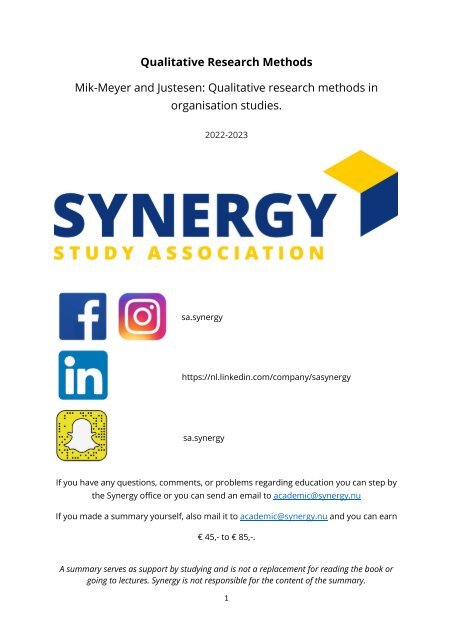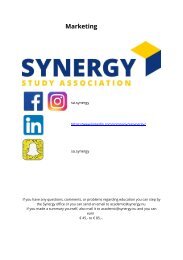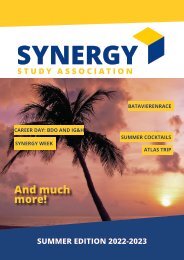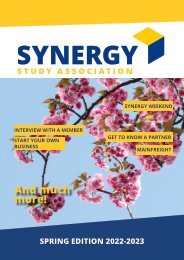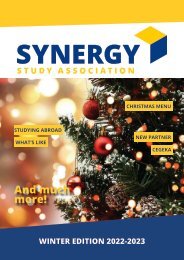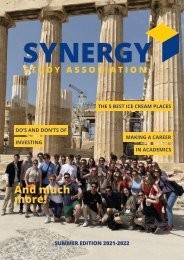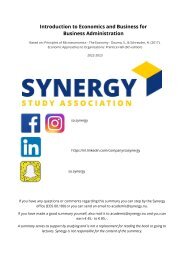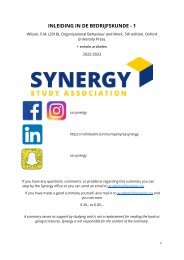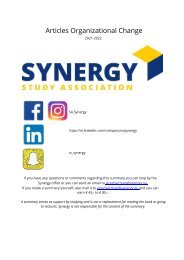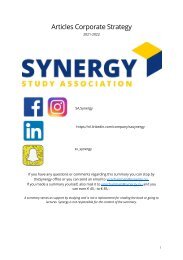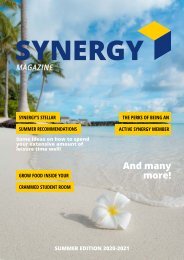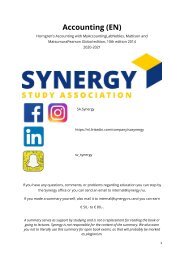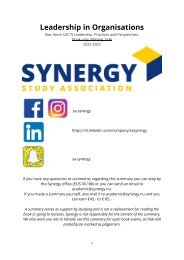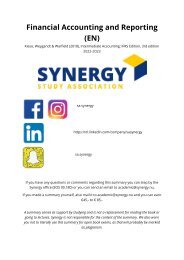Qualitative Researach Methods - Book 1
Erfolgreiche ePaper selbst erstellen
Machen Sie aus Ihren PDF Publikationen ein blätterbares Flipbook mit unserer einzigartigen Google optimierten e-Paper Software.
<strong>Qualitative</strong> Research <strong>Methods</strong><br />
Mik-Meyer and Justesen: <strong>Qualitative</strong> research methods in<br />
organisation studies.<br />
2022-2023<br />
sa.synergy<br />
https://nl.linkedin.com/company/sasynergy<br />
sa.synergy<br />
If you have any questions, comments, or problems regarding education you can step by<br />
the Synergy office or you can send an email to academic@synergy.nu<br />
If you made a summary yourself, also mail it to academic@synergy.nu and you can earn<br />
€ 45,- to € 85,-.<br />
A summary serves as support by studying and is not a replacement for reading the book or<br />
going to lectures. Synergy is not responsible for the content of the summary.<br />
1
Table of Contents<br />
Summary of Mik-Meyer and Justesen: <strong>Qualitative</strong> research methods in organisation<br />
studies. ....................................................................................................................................... 3<br />
Chapter 1: Introduction ........................................................................................................ 3<br />
Chapter 2: Quality criteria .................................................................................................... 4<br />
Chapter 3: Interviews ............................................................................................................ 5<br />
Chapter 5: participant observation ...................................................................................... 6<br />
Chapter 6: Documents .......................................................................................................... 8<br />
Chapter 7: Short summary of the book ............................................................................... 8<br />
2
Summary of Mik-Meyer and Justesen: <strong>Qualitative</strong> research<br />
methods in organisation studies.<br />
Chapter 1: Introduction<br />
The 3 perspectives described in the book (realism, phenomenology and constructivism)<br />
are often used in social research and organisational studies.<br />
Ontology = the study of the nature of being à how we view the subject/object of our<br />
study<br />
Epistemology = theory of knowledge à concerned with our ability to attain knowledge of<br />
a subject area<br />
Quantitative methodology = generates data that forms the basis of numerical analysis<br />
à descriptive or explanatory<br />
à are often based on a realist perspective<br />
<strong>Qualitative</strong> methodology = uses non-numerical data, such as interviews. Not<br />
measured in terms of quantity, amount, intensity or frequency.<br />
Realist perspective:<br />
Perspective that is based on a fundamental assumption that reality exists in a specific<br />
and in principle unambiguous manner “out there” independently of our knowledge of it.<br />
Research is to capture the phenomena that interest us and to describe them as<br />
accurately, neutrally and clearly as possible.<br />
there is a single reality, it exists in a certain form, independently of our language and<br />
knowledge > it is objective. To attain knowledge, we must minimize subjective and<br />
contextual elements as far as possible à knowledge is objective<br />
- descriptive and explanatory<br />
- sub-categories:<br />
- positivism<br />
- critical rationalism<br />
- critical realism<br />
- post-positivism<br />
- objective descriptions are important!<br />
à but is an ideal, perfect reflection of reality = impossible<br />
- realism seeks to reveal social structures that govern behaviour.<br />
- dual focus on the actors and the underlying mechanisms/structures à object is<br />
partially hidden<br />
- context assumes major significance in realism: how does it interact with the object?<br />
- Discussion on the nature of reality are based on three dimensions: (1) truth à what do<br />
we understand by the concept of true in relation to false? (2) materiality à what do we<br />
understand by the concept of materiality in relation to illusion? (3) essence à what do we<br />
understand by the concept of essence in relation to construction? àDimensions form the<br />
basis on which realists and constructivists discuss what is real and how this reality can<br />
be observed.<br />
Phenomenology perspective<br />
3
- represents a break with the ideal of objectivity of realism<br />
- All facts are from the outsets facts selected from a universal context by the activities of<br />
our mind > always interpreted facts. There is no access to reality outside of our<br />
knowledge or interpretation of it<br />
- subjectivity and interpretation are crucial on ontological/epistemological level<br />
- ‘there has to be a subject who experiences the phenomenon, otherwise there would be<br />
no phenomenon.’<br />
- key concept = life-world à everyday world we take for granted (= collective world)<br />
- interested in motives behind action<br />
à in-order motives à future state that the individual seeks to achieve<br />
through the action<br />
à because motives à to past experiences cause an individual to act as<br />
he/she does<br />
- no neutral researcher, focus on unique and specific, other concept of truth.<br />
Constructivist perspective<br />
- our knowledge of the world consists of construction of reality<br />
- phenomena are contingent à historically/socially conditioned<br />
- world is collectively constructed<br />
- anti-essentialists analysis, reality has no essential core/meaning, but is shaped into<br />
something specific via contingent social and historical processes and practices.<br />
- critical of the notion that there is a single independent , unique reality, but also reject<br />
the idea that reality (singular of plural) has an inherent essence or a stable and coherent<br />
meaningfulness. Object of study is never looked at independently of social processes,<br />
and its specific context. à constructed constantly à both ambiguous and unstable.<br />
(different from phenomenology)<br />
Different theoretical perspectives lead to different types of research questions.<br />
Chapter 2: Quality criteria<br />
General quality criteria’s:<br />
- coherence = the extent to which the components part of a study are logically coherent<br />
- consistency = requires that concepts, methodology and theories be applied in a<br />
consequent manner through the project<br />
- precision = concepts must be clearly defined<br />
- transparency = the way of approaching and choices about methods must be clear<br />
- validity = the extent to which the study’s findings actually shed light on the research<br />
question. ‘Do we measure what we say we will measure.’<br />
- reliability = whether the study’s methodology is well defined and if the study could be<br />
repeated<br />
The meaning of validity is dependent on the research perspective. Both concepts are<br />
defined different by the 3 perspectives and sometimes note even used.<br />
Realism and quality criteria<br />
4
- most easily uses the validity and reliability criteria<br />
- generalisability = the desire to generalise a study’s findings<br />
- representativeness = those selected for the research must be representative for the<br />
larger group<br />
- triangulation = adopting more than one angle on the same subject (to reduce bias,<br />
increase robustness & validity<br />
à see Yin for the 4 types of triangulation (data, methods, theory and investigator<br />
triangulation)<br />
Phenomenology and quality criteria<br />
- communicative validity = testing the validity claims in dialogue. Subjective to the<br />
experiences of the interviewees (respondent validity)<br />
- quality of craftsmanship = social, intersubjective practice in which a consensus has<br />
been reached about what constitutes good craftsmanship in research<br />
Constructivism and quality criteria<br />
- criteria are highly context dependent<br />
- research must be convincing, relevant or interesting<br />
- reflexivity = requires the researcher to reflect upon the role that their own<br />
position/experiences play in the study<br />
- desire for polyphony = making room for different voices, that are supressed or<br />
marginalised (e.g. official organization discourse)<br />
Chapter 3: Interviews<br />
Concept of interview = ‘an inter change of views between 2 persons conversing about a<br />
theme of mutual interest.’<br />
Concepts, key questions and theory<br />
Unstructured interview =<br />
- interviewee is responsible for structure, leading the conversation<br />
- suited for exploratory studies<br />
- how & what questions<br />
Semi-structured interview =<br />
- interviewer works from a guide<br />
- themes/key issues defined in advance<br />
- exploratory research with how & what questions<br />
Structured interview =<br />
- interview guide designed in advance<br />
- questions and order are already prepared<br />
An interview differs from a normal conversation in:<br />
1. an interview has an underlying purpose<br />
2. an interview is more or less structured through the interview guide<br />
3. in an interview the roles are determined (interviewer vs. interviewee)<br />
Realist studies will be more interest in the interview’s what and see the context as noise.<br />
5
Constructivist analysis often have an interest in analysing the interview’s how.<br />
Realism<br />
- mining metaphor of ‘digging out valuable knowledge or meaning’ from the interviewee<br />
- a structured interview will increase reliability & generalisability<br />
- this minimizes the interviewer effect = influence of the interviewer on the interviewee<br />
- assumption that the interviewee possesses knowledge about the issue of the study<br />
Phenomenology<br />
- point is to describe reality as people receive it<br />
- open questions aimed at extracting examples à semi-structured interview<br />
- establish an open-minded space<br />
- concept of inter-subjectivity is central à mutual influencing is seen as inevitable<br />
condition of human interaction<br />
Constructivism<br />
- knowledge is dependent upon perspectives and is constructed in social processes<br />
- context of interviews plays a central role<br />
- constructivists pay attention to how the design/guide/techniques/location etc. affect<br />
the interview itself<br />
- great deal of discussion about influence of behaviour, gender, age on the interview<br />
- open question, but empathy does not help in getting insight (different from<br />
phenomenology, who believe that empathy is an important task for the interviewer)<br />
Chapter 5: participant observation<br />
P.O. enables more informal knowledge about object of study:<br />
- no appointment is needed<br />
- is a time-consuming method<br />
- suited to build up unprocessed knowledge about practice<br />
- provides info about ‘tacit-knowledge’<br />
- option to observe from an ‘outside-looking-in’ viewpoint or observe and participate (=<br />
‘insider’ viewpoint)<br />
Concepts, key question and theory<br />
- unpredictable and creative process<br />
- should be very focused and relatively structured when having limited time<br />
- can choose between:<br />
1. total participant = going native<br />
2. total observer = very distance<br />
3. participant-as-observer<br />
4. observer-as-participant<br />
- detailed notes made in the field are very important<br />
1. brief notes = reminder of event<br />
2. descriptive notes = reproduce an event<br />
3. analytical notes = relate the descriptive notes to each other<br />
4. reflective notes = document the observers feelings/thoughts<br />
Advantages<br />
6
- easy method of gaining insider knowledge<br />
- well place to produce ‘holistic’ analysis<br />
Disadvantages<br />
- time-consuming<br />
- not easy to obtain access<br />
- high risk of misunderstanding and misinterpretation<br />
Perspective-implications<br />
- clear phenomenological feature<br />
- emic (inside) and etic (outside)<br />
Realism<br />
- to get ‘behind the façade’ of reality<br />
- avoid errors that are present in majority of qualitative studies<br />
- gain an insight into reality that remains concealed otherwise<br />
In realist inspired studies, there is a tendency to develop methods and techniques to<br />
ensure that the students personal situation (gender, age, educational background..)<br />
plays as small role as possible. > Ideal of capturing an objective reality, the most useful<br />
material in this perspective is collected by means of pure observation methods.<br />
Phenomenology<br />
- gaining insight into the life-world of the actors<br />
- requires sensitivity and empathy (thus observation over longer period)<br />
- emic, insider view<br />
- focus is on participants feelings experiences and motives<br />
- objectively produced descriptions of subjectively produced opinions<br />
Phenomenology inspired studies, the students will try to capture the actor’s life worlds<br />
in a tangible and methodical manner by establishing trusting and empathetic<br />
relationships with them. > Through empathy and sensitivity to get as close as possible to<br />
their everyday lives and experiences > get an insight into the collective work in relation<br />
to which their actions should be understood. > intervene as little as possible in order to<br />
minimize the impact upon the site being studied.<br />
Constructivism<br />
- does emphasize relations between social actors, but has no ambition of understand<br />
reality as understood by participants<br />
- focuses on practices and institutional conditions<br />
- actively relate to the theory in advance<br />
In constructivist inspired studies, the starting point for Participant observation is that<br />
the student will influence the field via her personality, experiences and research focus.<br />
However the assumption is that this effect is an inherent condition of social science<br />
studies that emphasise the importance of human activity. > actively relate to these basic<br />
conditions in her analysis work = not trying to minimize the impact on the actors in the<br />
field.<br />
7
Chapter 6: Documents<br />
Documents are an integral part of contemporary organisational reality. Documents can<br />
be and are used as qualitative material in research. Document studies are based on<br />
empirical material, which is created independently of the researcher’s project.<br />
Neo-institutional perspective argues that organizations produce documents for<br />
legitimacy, rationality and accountability à these types of studies focus on production<br />
process or consumption process<br />
Concept of intertextuality is key à texts very often refer to other texts<br />
Genre = relatively, homogeneous group of texts that differ from others in style,<br />
composition and theme. Theoretical and practical questions involved. Practical<br />
questions about documents are about the selection and the access.<br />
Production process studies are about how did the document come about, how was it<br />
written.<br />
Consumption process studies are about how was it received and processed through the<br />
organization and the people who read it.<br />
Realism<br />
- documents are seen as a form of source material that provides insights in reality<br />
- crucial to be critical and select<br />
- content analysis (template method)<br />
- high credibility, representativeness and neutrality are important.<br />
Phenomenology<br />
- will be more interested in ‘everyday texts’<br />
- aim is to study how documents become meaning full in a person’s subjective<br />
experience<br />
- choose texts that are meaningful to the actors à combination of document studies with<br />
interviews and observation<br />
Constructivism<br />
- rejects the idea that representativeness is a critical criterion (just as phenomenology)<br />
- texts must be exemplary à illustrating a particular point<br />
- assumption that texts actively help shape perception and construct concepts<br />
- texts must also be normative or reflective.<br />
Chapter 7: Short summary of the book<br />
Good research question = practical and corresponds with the chosen perspective<br />
A qualitative study starts with curiosity à translated into research problem à into<br />
research question à methodology<br />
Summary of perspectives:<br />
Realism = single reality that exists in a particular way, regardless of the knowledge of it<br />
and the used language<br />
Phenomenology = several different realities only meaningful if we understand it in terms<br />
of subject’s experience and interpretations<br />
Constructivism = understanding of reality is a social construction.<br />
8


